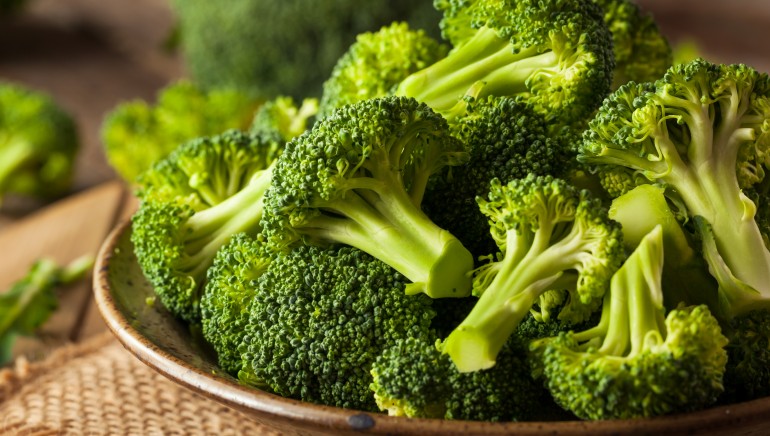Broccoli is a green vegetable that vaguely resembles a miniature tree. It belongs to the plant species known as Brassica oleracea. It’s closely related to cabbage, Brussels sprouts, kale and cauliflower all edible plants collectively referred to as cruciferous vegetables. Broccoli contains many vitamins, minerals, fiber, and antioxidants. Broccoli’s benefits include helping reduce swelling, keeping blood sugar stable, and strengthening the immune health. Broccoli is a nutrient-rich vegetable that may enhance our health in a variety of ways, such as by reducing inflammation, improving blood sugar control, boosting immunity and promoting heart health.
Broccoli has high levels of glucoraphanin, a compound that is converted into a potential antioxidant called sulforaphane during digestion. This can lead to reduced inflammation (swelling) and an overall health-protective effect. Broccoli also contains measurable amounts of the antioxidants lutein and zeaxanthin, which may prevent oxidative stress and cellular damage in your eyes. Broccoli contains multiple potent (potential) antioxidants that may support healthy cells and tissues throughout our health.
Here are the seven ways health benefits of broccoli:
- Vitamins, Minerals and Bioactive Compounds as present in broccoli:
Broccoli can be eaten cooked or raw both are perfectly healthy but provide different nutrient. Broccoli is a rich source of multiple vitamins, minerals and fiber. Different cooking
methods may affect the vegetable’s nutrient composition, but broccoli is a
healthy addition to our diet whether cooked or raw.
There are several methods cooking such as boiling, microwaving, stir-frying and steaming, alter the vegetable’s nutrient composition, particularly reducing vitamin C, as well as soluble protein and sugar. Steaming appears to have the fewest negative effects.
Broccoli has multiple vitamins and minerals such as protein 2.6 grams, fat 0.3 grams, fiber 2.4 grams, vitamin C 135%, vitamin A 11% , vitamin K 116%, vitamin B9 (Foliate)14% , potassium 8% ,phosphorus 6%.
- Antioxidants:
Broccoli has high levels of glucoraphanin, a compound that is converted into a potential antioxidant called sulforaphane during digestion. Antioxidants are molecules that inhibit or neutralize cell damage caused by free radicals.
Test-tube and animal studies indicate that sulforaphane may offer multiple health benefits, including reduced blood sugar, cholesterol levels, oxidative stress and chronic disease development. However, more research is needed to understand its role in human health.
- Protect against certain types of Cancer
Cruciferous vegetables, such as broccoli, contain various bioactive compounds that may reduce cell damage caused by certain chronic diseases.
Multiple studies have shown that eating cruciferous vegetables may protect against certain types of cancer such as Breast, Prostate, Gastric/stomach, Colorectal Renal/kidney, and Bladder. It isn’t strong enough to make definitive health claims regarding broccoli’s role in cancer treatment or prevention.
- Blood Sugar Control
Eating broccoli may support better blood sugar control in people with diabetes. It may be related to broccoli’s antioxidant.
An animal study revealed decreased blood sugar in addition to reduced pancreatic cell damage in diabetic rats fed broccoli.
Broccoli is also a good source of fiber. Some research indicates that higher intake of dietary fiber is associated with lower blood sugar and improved diabetic control.
- Protect our Heart Health
Cholesterol and triglyceride levels are known to be major risk factors for heart disease. Broccoli may play a role in improving these mentions below.
- One study shown significantly reduced triglycerides and cholesterol, as well as increased cholesterol levels in people who were treated with a powdered broccoli sprout supplement.
- Broccoli sprouts revealed a potentially protective effect against cell death and oxidative stress in heart tissue following a cardiac arrest.
Additionally, higher intake of fiber-rich foods like broccoli is associated with a reduced risk of heart disease.
- Healthy For Our Digestion and Reduced Constipation
Broccoli is rich in fiber and antioxidants both of which may support healthy bowel function and digestive health.
Bowel regularity and a strong community of healthy bacteria within your colon are two vital components to digestive health. Eating fiber- and antioxidant-rich foods like broccoli may play a role in maintaining health.
- Healthy For Our Brain Function
Some of the nutrients and bioactive compounds in broccoli may slow mental decline and healthy for our brain and nervous tissue function.
A study in 960 older adults revealed that one serving per day of dark green vegetables, such as broccoli, may help resist mental decline associated with aging.
Additionally, an animal study showed that mice treated with kaempferol a compound in broccoli had lowered incidence of brain injury and reduced inflammation of neural tissue following a stroke-like event.
Sulforaphane is another potent bioactive compound present in broccoli with the potential to support our brain function after an event of reduced oxygenation to the brain.

 Sulforaphane is a ubiquitous sulfur-containing compound found in broccoli. It has been shown to provide significant health benefits. It has potent anti-inflammatory properties. Studies have shown that sulforaphane can inhibit the production of inflammatory substances and reduce inflammatory markers.
Sulforaphane is a ubiquitous sulfur-containing compound found in broccoli. It has been shown to provide significant health benefits. It has potent anti-inflammatory properties. Studies have shown that sulforaphane can inhibit the production of inflammatory substances and reduce inflammatory markers.




















.jpeg)












